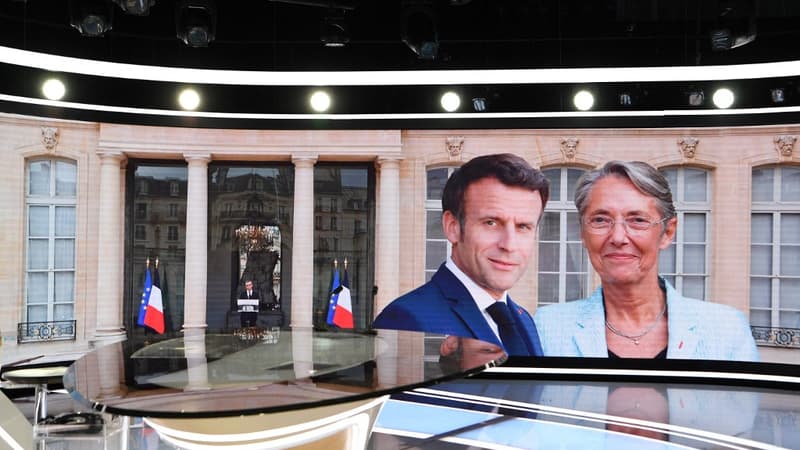A televised intervention to reduce the pressure. After the rejection by only 9 votes of the inter-party motion of no confidence and the multiplication of spontaneous mobilizations against the pension reform, Emmanuel Macron wants to regain control.
More accustomed to dedicated speeches or special programs -such as during two special afternoons last autumn-, the President of the Republic has chosen this moment to invite himself to the 1:00 p.m. Elysium. The interview will also be broadcast on BFMTV, with a special edition at noon.
Not 20 Hours turned to the national
To justify this choice, Emmanuel Macron’s environment evokes “the choice of territories”. From the competition between the “most beautiful markets in France” to the safeguarding of endangered craft trades, these two newscasts want to be the representatives of the terroirs. But the observation leaves some specialists in political communication skeptical.
“It is a bit strange to speak in newspapers with a more regional tone to talk about a reform that will involve generations of French people. About 20 hours with a more national orientation would have been more appropriate”, analyzes the communicator Philippe Moreau – Chevrolet.
It will be only the second time in six years of the presidency that the head of state will speak during lunchtime on television. The first and only experience so far had taken place in April 2018 with a singer from the territories, Jean-Pierre Pernaut, during a newspaper transferred to a primary school in Berd’huis, in the Orne.
Unpublished interview to avoid any comparison
We saw the President of the Republic sitting in a class, with a calendar on the wall, children’s drawings and school supplies, all in a town of 1,100 inhabitants considered by TF1 as “the reflection of French municipalities”. This frame was meant to be symbolic, while Emmanuel Macron is regularly accused by his detractors of being a “president of cities”.
A former ministerial adviser from the previous five-year term sees another reason for this return to 1pm, despite not being used to political interviews. “It’s quite smart of him to do an unprecedented exercise,” deciphers this good connoisseur of the mysteries of power.
“We will not be able to make an audience comparison with statements by other figures in political life or previous presidential interventions.”
The choice of retired viewers.
The Élysée also sees in the choice of this interview this Wednesday at noon the desire to address “the many French who return home for lunchtime” and, therefore, the employees. They are the ones who will be directly affected by the pension reform.
The audience data for TF1 and France 2, however, put this objective into perspective: the average age of the viewer of the JT of the first chain is 61.5 years. It rises to almost 65 for public service.
This is precisely what the opposition criticizes the head of state. “Another contempt for the assets that overwhelmingly oppose his reform. At 1:00 p.m., the latter are working!” Eliane Assassi, the president of the communist senators, announced on her Twitter account.
“The president is very clearly choosing to address an elderly electorate who voted for him and who massively supports the pension reform. It is a choice of comfort,” Gaspard Gantzer, François Hollande’s former communicator at the Élysée, also deciphers.
The mobilization against the pension reform is much more sustained in the active ranks (70%) compared to 53% of retirees, according to an Elabe survey for BFMTV.
A relatively classic format
The presidency also insists on “the choice of the contradictory” since Emmanuel Macron will be interviewed by Marie-Sophie Lacarrau and Julian Bugier. This will be the first time that these journalists will interview the president.
If the head of state had ever taken a risk during his first term, by facing, for example, Edwy Plenel, the founder of Mediapart, in April 2018, or the Brut medium in January 2020, the Élysée this time made a classic plus choice.
“They’re not bad, they’re quite flexible,” said Laurent Vibert, a crisis communication specialist.
Will this television performance be enough to lower the pressure? Viewers should not expect to see Emmanuel Macron overturn the table. The president has already made it known to his environment that he does not intend to dissolve the National Assembly, nor remodel the government, nor withdraw the reform. This Thursday a new day of inter-union action will be organized.
Source: BFM TV


